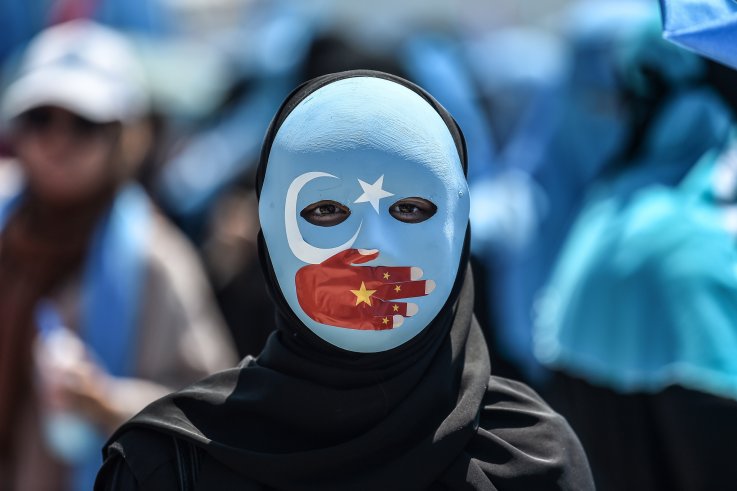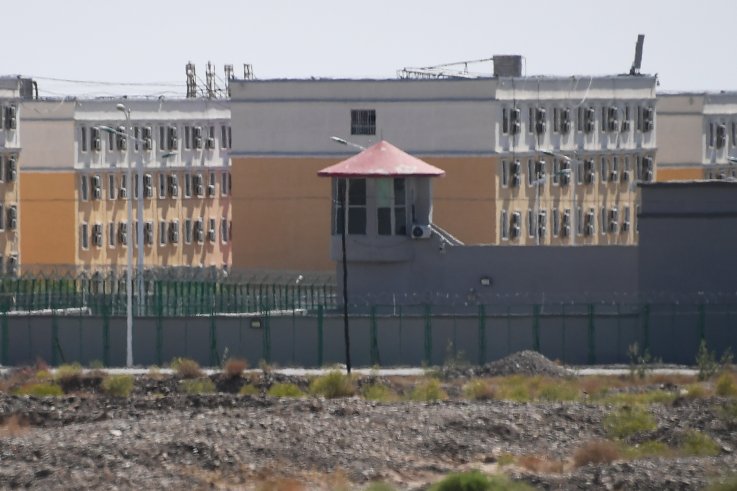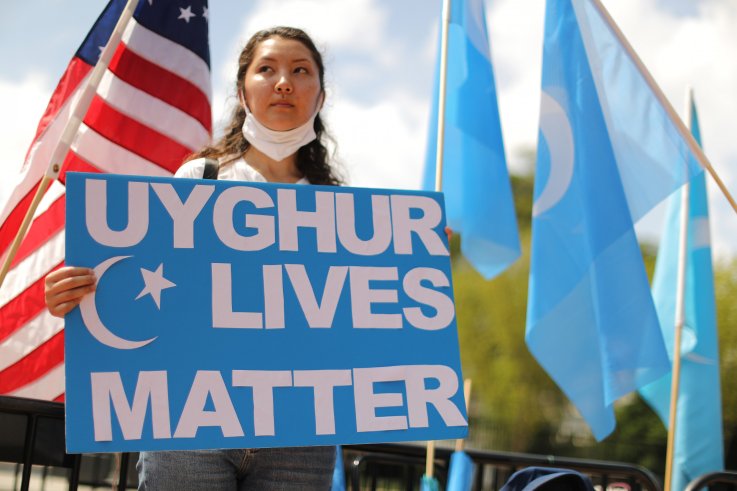China's Uyghur 'Reeducation': Needles in Pregnant Bellies, Under Fingernails
The horrors of the "reeducation camps" for Uyghurs in the Xinjiang region of northwest China are now coming to light, thanks to an independent tribunal now meeting in London.
The stories the center's "students" are telling are not for the faint of heart.
Speaking to The Associated Press before the tribunal began, a witness named Bumeryem Rozi said she underwent a forced abortion while she was more than six months pregnant, a practice that another witness told the AP was common when mothers gave birth to more children than they were officially permitted to have.

"They first gave me a pill and said to take it, so I did," Rozi told The Associated Press. "I didn't know what it was. Half an hour later, they put a needle in my belly. And sometime after that I lost my child."
Omir Bekali spoke on the opening day of the tribunal. Bekali, who grew up attending Uyghur schools, said he was taken into custody while visiting family on a trip to China from his home in Kazakhstan.
He testified that he was subjected to torturous interrogation techniques, locked in a small cell for a full month, heavily surveilled and required to take "unknown medicines," according to his prepared statement.
"They made me sit on the 'tiger' chair," Bekali wrote of his early interrogation, which he said lasted four days and continued overnight. "They hung me from the ceiling. They chained me to the wall and beat me with plastic, wooden, electric batons and metal wire whip. They pierced needles under my nails."
Lauren Baillie, a senior program officer at the U.S. Institute of Peace who specializes in atrocity prevention, told Newsweek the tribunal's focus on personal experiences is key.
"Putting the victims at the center of this is really important, because these are people who right now are feeling really disenfranchised," she said.
Human rights experts say they are hopeful witness testimony presented at an independent tribunal focusing on the alleged torture of Uyghurs by officials in Xinjiang will spur the international community to place economic pressures on China.
Several countries, including the U.S., have condemned China over reports of forced labor, abortions, sterilization, beatings and more aimed at members of the Uyghur community.
But China has repeatedly denied the allegations, with one spokesperson voicing "severe condemnation and opposition" to the tribunal's proceedings and saying China "will be forced to take countermeasures" in response, according to the Associated Press.
The stated goals of the tribunal are to "investigate 'ongoing atrocities and possible Genocide' against the Uyghurs, Kazakhs and other Turkic Muslim Populations." Geoffrey Nice, a human rights lawyer, was asked by the president of the World Uyghur Congress to create and oversee the tribunal last June. A second set of hearings is expected to take place in September.

Beth Van Schaack, a visiting professor of human rights at Stanford Law School who contributed to a recent Human Rights Watch (HRW) report about the Uyghur people in Xinjiang, told Newsweek this kind of independent tribunal has no enforcement authority but can still "carry a lot of weight" internationally.
"It will have great symbolic value, I hope, in further shedding light on the type of abuse that's happening within Xinjiang," Van Schaack said.
"Because China is so big, they have outsized influence in the international community, and so the international community needs a collective response," Van Schaack added. "We need to work together; it cannot be one nation here and one nation there."
Uyghurs are believed to comprise most of the estimated 1 million people who have been taken to detention camps—which the Chinese government has referred to as "re-education camps"—in the Xinjiang region over the last several years, according to the AP.
HRW's April report accused China of crimes against humanity for its alleged treatment of the Uyghur people and other Turkic Muslim groups. The report explored several of the allegations China is facing—which include mass detention and surveillance, torture of incarcerated individuals, forced labor and cultural erasure, and reproductive rights violations—and offered recommendations to the Chinese government, the United Nations (U.N.) and the international community at large.
Among the HRW's list of recommendations for concerned countries are sanctions and other trade penalties. While Van Schaack said China likely "gets annoyed" by reports like the one HRW released, those condemnations don't "hurt the bottom line" the way trade penalties can.
"I think focusing on supply chains across the world could be an incredibly powerful lever against China and one that China will feel," she said.
The tribunal provides a public platform for Uyghur victims that could inspire other countries to act, she added.

"That's an area where the international community could get itself coordinated and actually impose a series of impediments to China being able to export these goods," Van Schaack said. "And China will feel that in a very tangible way,"
The U.S. joined a handful of allied countries in imposing sanctions on some Xinjiang government officials earlier this year. Identifying other names to add to that sanctions list and rallying additional support for trade restrictions are among the ways the tribunal can make an impact, though Baillie said encouraging a tougher response from organizations like the U.N. will also likely be necessary.
"Beijing may not be affected as much by these public initiatives, but the U.N. initiatives and the places where Beijing sees itself as having a lot of prestige could really have an impact on their behavior," Baillie said.
Though the tribunal itself will not have the power to enforce recommendations based on the evidence it gathers, Baillie said focusing on the experiences of people like Bekali and Rozi may serve as a powerful tool in convincing the international community to act.
"The more that the victims can be placed at the center of it and given that platform to tell their stories, the more potentially impactful" the tribunal's final report could be, Baillie said.
"The U.S. and like-minded actors could really seize on this and use it to advocate for more formal international accountability," she added.

